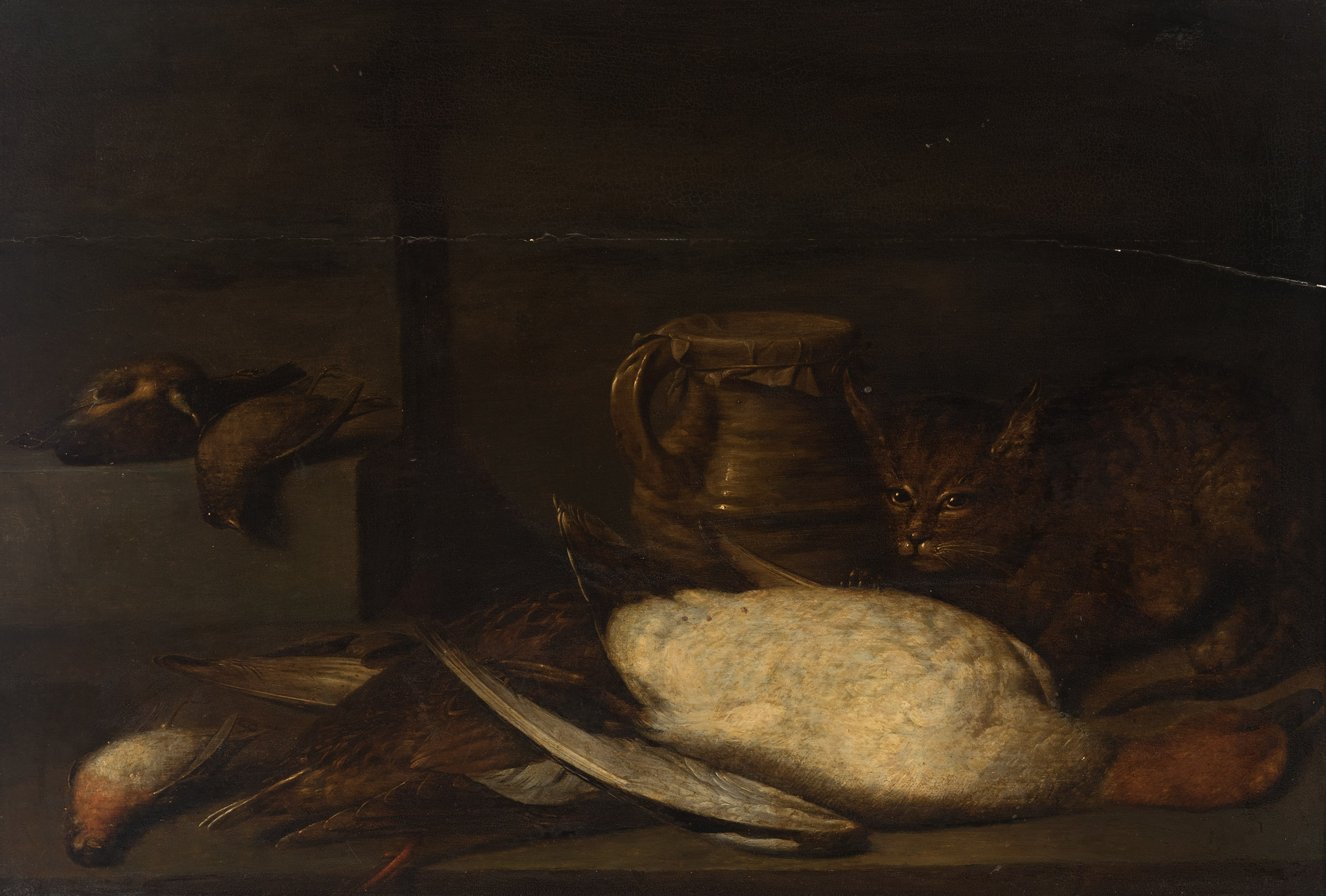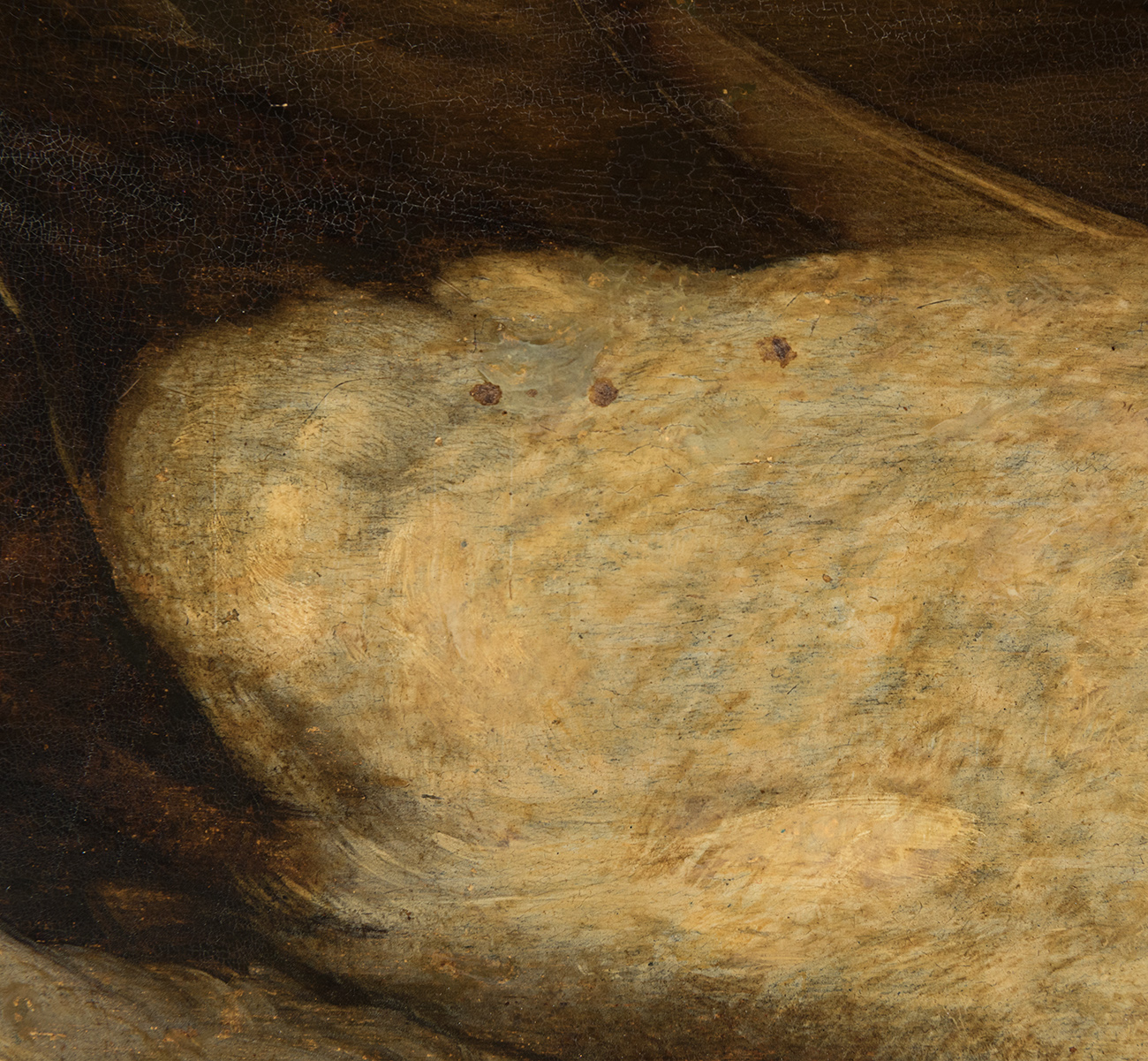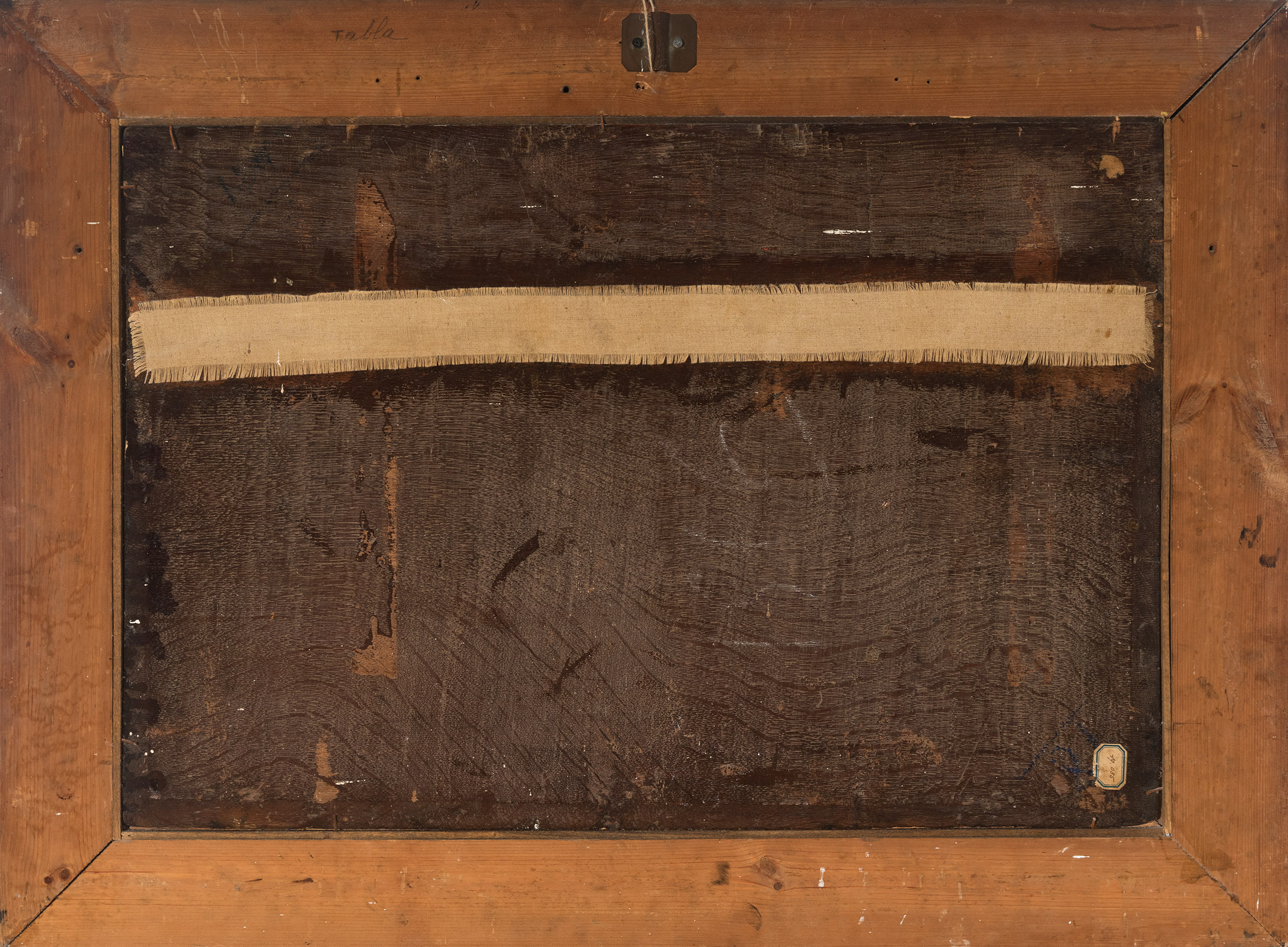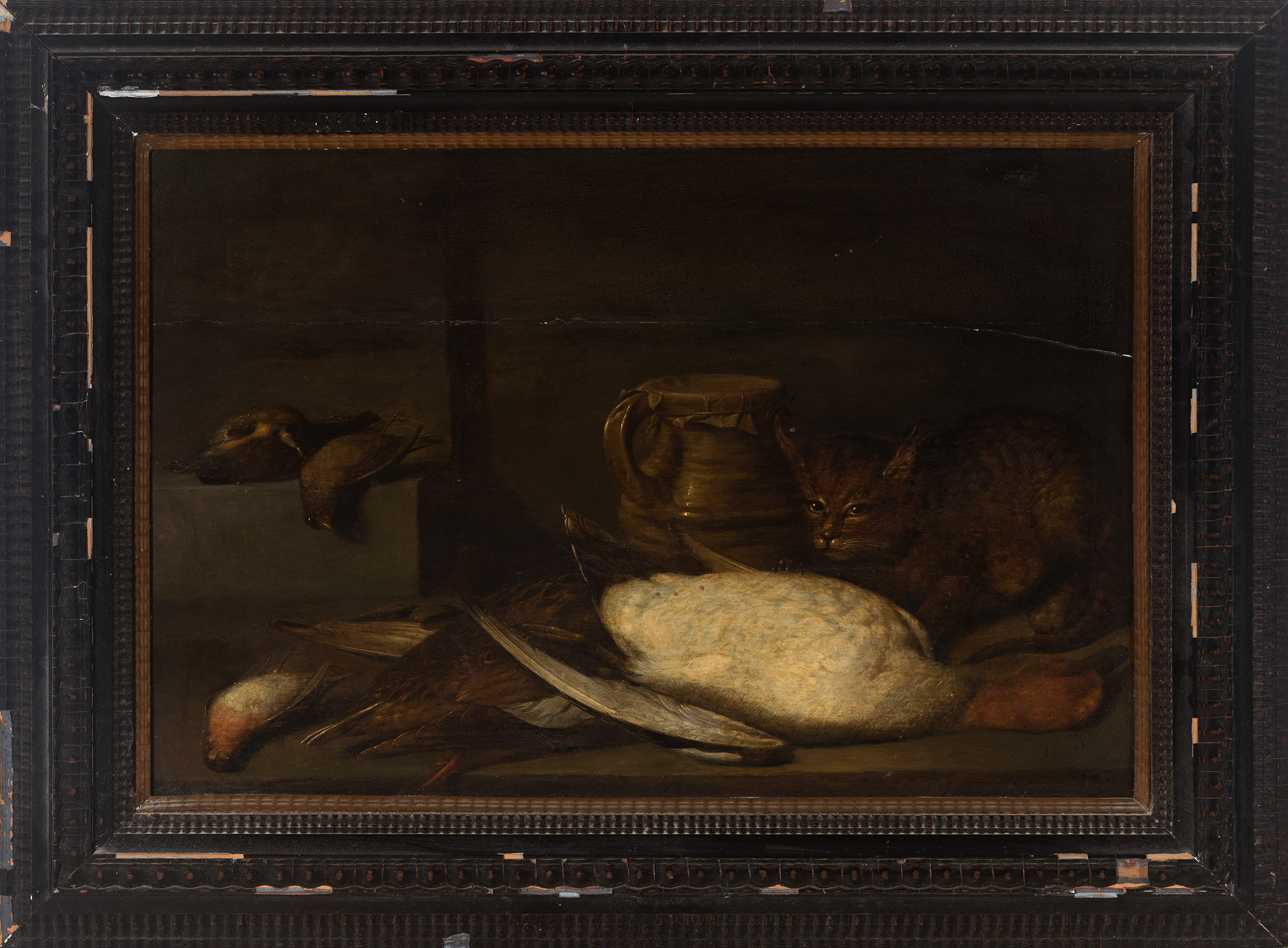57
Flemish school; 17th century."Still life".Oil on oak panel.It has faults and restorations.It has
1/4
Description
Flemish school; 17th century.
"Still life".
Oil on oak panel.
It has faults and restorations.
It has an early 20th century frame with faults.
Provenance: Marquises of Cortina.
Measurements: 48 x 70 cm: 76 x 89 cm (frame).
This canvas combines the tradition of the hunting still life. The work, which is structured on the basis of several planes in depth, shows in the foreground the figure of a duck, which is the protagonist of the composition not only because of its great volume and location, but also because of the luminosity that its white plumage brings to the scene. Next to it lie other birds, both in the foreground and in the background, with a cat gazing attentively at the viewer. The presence of live animals lends a narrative sense to the scene, in a taste for scenography and realism typical of the Baroque period.
During the 17th century in Flanders there was a growing demand for paintings to decorate the houses of the bourgeoisie. Apart from portraits and large canvases with religious, historical or mythological themes, artists specialised, painting medium-sized works that gradually increased in format, with still lifes, animals, landscapes and genre scenes. Paintings reproducing collectors' cabinets of the period are explicit in this respect, to the point of giving rise to a new, independent genre of painting. Undoubtedly, the future of this painting would have been different without Rubens, whose art revolutionised the Flemish art scene by introducing a new, fully Baroque approach and bringing a sense of unity and opulent sumptuousness to the ordered and encyclopaedic display of his countrymen's precious depictions. The specialists, either indebted to his manner or subordinate to his work, worked along new lines, adding an accessory object, a landscape or a decorative background to their compositions. Within 17th-century Flemish still-life painting, two trends can be distinguished, the static, represented by Clara Peeters and Osias Beert, and the dynamic, with Frans Snyders and Paul de Vos.
"Still life".
Oil on oak panel.
It has faults and restorations.
It has an early 20th century frame with faults.
Provenance: Marquises of Cortina.
Measurements: 48 x 70 cm: 76 x 89 cm (frame).
This canvas combines the tradition of the hunting still life. The work, which is structured on the basis of several planes in depth, shows in the foreground the figure of a duck, which is the protagonist of the composition not only because of its great volume and location, but also because of the luminosity that its white plumage brings to the scene. Next to it lie other birds, both in the foreground and in the background, with a cat gazing attentively at the viewer. The presence of live animals lends a narrative sense to the scene, in a taste for scenography and realism typical of the Baroque period.
During the 17th century in Flanders there was a growing demand for paintings to decorate the houses of the bourgeoisie. Apart from portraits and large canvases with religious, historical or mythological themes, artists specialised, painting medium-sized works that gradually increased in format, with still lifes, animals, landscapes and genre scenes. Paintings reproducing collectors' cabinets of the period are explicit in this respect, to the point of giving rise to a new, independent genre of painting. Undoubtedly, the future of this painting would have been different without Rubens, whose art revolutionised the Flemish art scene by introducing a new, fully Baroque approach and bringing a sense of unity and opulent sumptuousness to the ordered and encyclopaedic display of his countrymen's precious depictions. The specialists, either indebted to his manner or subordinate to his work, worked along new lines, adding an accessory object, a landscape or a decorative background to their compositions. Within 17th-century Flemish still-life painting, two trends can be distinguished, the static, represented by Clara Peeters and Osias Beert, and the dynamic, with Frans Snyders and Paul de Vos.
Auction Details
Shipping
T&Cs & Important Info
Ask seller a question
Flemish school; 17th century.
"Still life".
Oil on oak panel.
It has faults and restorations.
It has an early 20th century frame with faults.
Provenance: Marquises of Cortina.
Measurements: 48 x 70 cm: 76 x 89 cm (frame).
This canvas combines the tradition of the hunting still life. The work, which is structured on the basis of several planes in depth, shows in the foreground the figure of a duck, which is the protagonist of the composition not only because of its great volume and location, but also because of the luminosity that its white plumage brings to the scene. Next to it lie other birds, both in the foreground and in the background, with a cat gazing attentively at the viewer. The presence of live animals lends a narrative sense to the scene, in a taste for scenography and realism typical of the Baroque period.
During the 17th century in Flanders there was a growing demand for paintings to decorate the houses of the bourgeoisie. Apart from portraits and large canvases with religious, historical or mythological themes, artists specialised, painting medium-sized works that gradually increased in format, with still lifes, animals, landscapes and genre scenes. Paintings reproducing collectors' cabinets of the period are explicit in this respect, to the point of giving rise to a new, independent genre of painting. Undoubtedly, the future of this painting would have been different without Rubens, whose art revolutionised the Flemish art scene by introducing a new, fully Baroque approach and bringing a sense of unity and opulent sumptuousness to the ordered and encyclopaedic display of his countrymen's precious depictions. The specialists, either indebted to his manner or subordinate to his work, worked along new lines, adding an accessory object, a landscape or a decorative background to their compositions. Within 17th-century Flemish still-life painting, two trends can be distinguished, the static, represented by Clara Peeters and Osias Beert, and the dynamic, with Frans Snyders and Paul de Vos.
"Still life".
Oil on oak panel.
It has faults and restorations.
It has an early 20th century frame with faults.
Provenance: Marquises of Cortina.
Measurements: 48 x 70 cm: 76 x 89 cm (frame).
This canvas combines the tradition of the hunting still life. The work, which is structured on the basis of several planes in depth, shows in the foreground the figure of a duck, which is the protagonist of the composition not only because of its great volume and location, but also because of the luminosity that its white plumage brings to the scene. Next to it lie other birds, both in the foreground and in the background, with a cat gazing attentively at the viewer. The presence of live animals lends a narrative sense to the scene, in a taste for scenography and realism typical of the Baroque period.
During the 17th century in Flanders there was a growing demand for paintings to decorate the houses of the bourgeoisie. Apart from portraits and large canvases with religious, historical or mythological themes, artists specialised, painting medium-sized works that gradually increased in format, with still lifes, animals, landscapes and genre scenes. Paintings reproducing collectors' cabinets of the period are explicit in this respect, to the point of giving rise to a new, independent genre of painting. Undoubtedly, the future of this painting would have been different without Rubens, whose art revolutionised the Flemish art scene by introducing a new, fully Baroque approach and bringing a sense of unity and opulent sumptuousness to the ordered and encyclopaedic display of his countrymen's precious depictions. The specialists, either indebted to his manner or subordinate to his work, worked along new lines, adding an accessory object, a landscape or a decorative background to their compositions. Within 17th-century Flemish still-life painting, two trends can be distinguished, the static, represented by Clara Peeters and Osias Beert, and the dynamic, with Frans Snyders and Paul de Vos.
29th December - Old Masters
Sale Date(s)
Venue Address
Aragón 346, Barcelona
Calle Velázquez 7, Madrid
Carrer de Cirilo Amorós 55, Valencia
Barcelona
08009
Spain
General delivery information available from the auctioneer
Setdart offers Worldwide shipping
PICK UP IN ROOM: You can come and pick up your lots in our offices (Barcelona, Madrid or Valencia). At the moment of the withdrawal, you will be able to accept the current conditions of the lot by means of a document that you will sign.
YOU CAN SEND ANOTHER PERSON TO PICK UP: This person must present a signed authorization that you can find in our web page by accessing from BUY AT SETDART- LOGISTICS-DOWNLOAD AUTHORIZATION DOCUMENT. You can also send an e-mail with the requested data in AUTHORIZATION DOCUMENT to admin@setdart.com
Important Information
25% buyer´s premium
21% buyer´s premium at www.setdart.com












